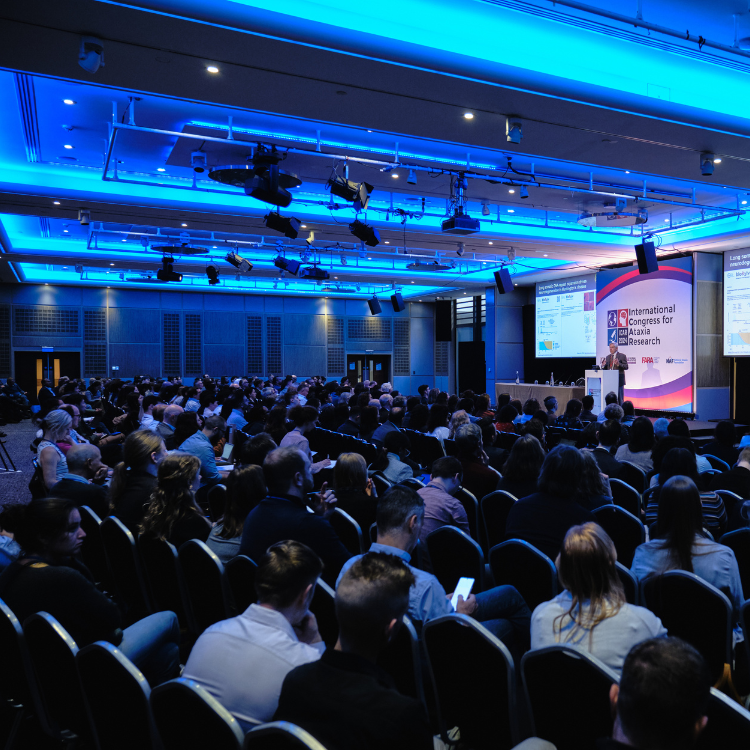ADVANCING RESEARCH THROUGH COLLABORATION
Scientific Conferences
By convening experts in the field, FARA facilitates the dissemination of information to define the status of research and identify knowledge gaps, promote the exchange of ideas and foster collaborations among scientists.

CONFERENCE HISTORY
Past Conferences

1999 – 1st FARA International Science Conference
80 Scientists
0 Pharmaceutical Companies
1 Advocacy Group
Summits, Workshops, and Meetings
FARA regularly organizes small meetings and workshops with FA investigators to tackle outstanding questions in FA research, address challenges of developing research and drug development resources, and seek opportunities to engage with regulatory agencies.
In 2023, FARA organized a workshop to address the question of what the function(s) of frataxin is/are. Invitees were experts in Fe-S cluster assembly and investigators who have uncovered evidence for frataxin functions beyond Fe-S cluster assembly. The workshop focused on new insights into frataxin function in Fe-S cluster assembly with implications for FA therapeutic development and a review of the evidence for other functions of frataxin. Presentation of published and unpublished data was followed by a round table discussion. Several potential opportunities for collaboration among the participants were identified.
The purpose of this meeting was to address shortcomings of the current FA murine models and issues of reproducibility of phenotypes among labs.
The 2023 Mouse Model workshop aimed to identify robust phenotypes (biochemical, histopathological, and neurobehavioral) and agree on protocols. Investigators who have developed, characterized, and are currently working with FA mouse models were invited to attend. The workshop focused on two FA models, the YGR 800 and the FRDAkd. Questions and topics to be addressed were developed in advance to facilitate the presentation of data challenging the robustness and reproducibility of phenotypes. Presentations of data were followed by a round table discussion. Before 2023, Mouse Model meetings/workshops were held in 2020, 2016, 2013, and 2012.
The purpose of this meeting was to review the state of biomarker and novel endpoint development for Friedreich’s ataxia. FARA’s goal is to have a toolbox of biomarkers and outcome assessments that can be used in various settings and for diverse treatment approaches. FA investigators, experts in biomarker development, and companies interested in developing therapies for FA were invited to attend.
The FARA 2020 Biomarker & Clinical Endpoint Meeting was held virtually on September 24-25, 2020, and focused on pharmacodynamic and monitoring biomarkers for translational and clinical applications and clinical outcome assessments.
Previous meetings were held in 2018, 2016, 2015 and 2014. The 2014 meeting was in partnership with the National Center for Advancing Translational Sciences (NCATS, part of the National Institutes of Health). It provided FARA with a priority list of potential biomarkers relevant to FA.
In June of 2017, FARA held an externally led patient-focused drug development meeting. This meeting, co-organized by the Friedreich’s Ataxia Research Alliance, Muscular Dystrophy Association, the National Ataxia Foundation, and the CureFA Foundation, marked the first time patients and families affected by FA had the opportunity to speak directly to the FDA and share their experiences in their own words. The Friedreich’s ataxia (FA) Patient Focused Drug Development (PFDD) meeting was set up to give feedback to the U.S. Food and Drug Administration (FDA) and drug developers about challenges and burdens patients and families have experienced with FA, and what is most important to the community in evaluating potential new treatments for the disease. More information about the meeting and the “Voice of the Patient” report from the meeting can be found here.
To facilitate communication, cooperation, and collaboration among researchers developing various types of cellular models, especially iPSC-based neuronal and cardiac models, the Cellular Model and Cell Therapy meeting was held in Chicago in 2010. One of the key outcomes of the meeting was consensus on the need for reproducible, stable, and well-characterized FA iPS cell lines that are appropriate for research (including drug screening), maintained in a reputable facility, and distributed among researchers.
The goal of this meeting was to advance understanding of the cardiac disease in FA. The Cardiac Summit held in 2010 included investigators representing diverse areas of basic science, clinical research, and cardiology. One of the goals of the meeting was to identify key clinical and basic science questions that need to be addressed to understand cardiac disease in FA. One outcome of the meeting was overwhelming consensus and support for improving cardiac care for individuals with FA. A previous cardiac summit was convened in 2007 and focused on identifying gaps in knowledge regarding cardiac disease in FA.







